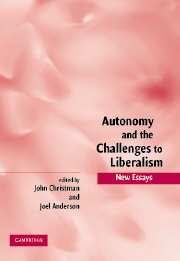Book contents
- Frontmatter
- Contents
- Contributors
- Preface
- Autonomy and the Challenges to Liberalism
- 1 Introduction
- PART I THE SELF: CONCEPTIONS OF THE AUTONOMOUS SELF
- PART II THE INTERPERSONAL: PERSONAL AUTHORITY AND INTERPERSONAL RECOGNITION
- PART III THE SOCIAL: PUBLIC POLICY AND LIBERAL PRINCIPLES
- 8 Autonomy, Domination, and the Republican Challenge to Liberalism
- 9 Liberal Autonomy and Consumer Sovereignty
- 10 Political Liberty: Integrating Five Conceptions of Autonomy
- PART IV THE POLITICAL: LIBERALISM, LEGITIMACY, AND PUBLIC REASON
- Bibliography
- Index
8 - Autonomy, Domination, and the Republican Challenge to Liberalism
Published online by Cambridge University Press: 02 December 2009
- Frontmatter
- Contents
- Contributors
- Preface
- Autonomy and the Challenges to Liberalism
- 1 Introduction
- PART I THE SELF: CONCEPTIONS OF THE AUTONOMOUS SELF
- PART II THE INTERPERSONAL: PERSONAL AUTHORITY AND INTERPERSONAL RECOGNITION
- PART III THE SOCIAL: PUBLIC POLICY AND LIBERAL PRINCIPLES
- 8 Autonomy, Domination, and the Republican Challenge to Liberalism
- 9 Liberal Autonomy and Consumer Sovereignty
- 10 Political Liberty: Integrating Five Conceptions of Autonomy
- PART IV THE POLITICAL: LIBERALISM, LEGITIMACY, AND PUBLIC REASON
- Bibliography
- Index
Summary
There was a time, not so long ago, when almost no one would have considered republicanism a challenge to liberalism. Conservatism, fascism, communism, and other forms of socialism were prominent on lists of liberalism's rivals, but not republicanism. Historians occasionally analyzed the classical republics of Greece and Rome, or the role of republican ideas in seventeenth-century England or the American founding period, but republicanism itself was not a live option in contemporary politics. In recent years, however, the situation has changed dramatically. Among political theorists, at least, the question now is not whether republicanism presents a challenge to liberalism but what kind of challenge it is.
On this question there are, broadly speaking, two points of view. According to one, republicanism and liberalism are fundamentally different schools of thought, and the republican challenge is to be welcomed or resisted, depending on one's position, as an attempt to supplant or replace liberalism. Whole-hearted liberals thus condemn republicanism as a danger to individual liberties and free societies, while neo-republicans such as Michael Sandel and Philip Pettit maintain that republicanism is not only different from but superior to liberalism. According to the other point of view, the features that liberalism and republicanism share are more telling than the differences that divide them. From this perspective, the republican challenge aims not at replacing or defeating liberalism but at correcting its course.
- Type
- Chapter
- Information
- Autonomy and the Challenges to LiberalismNew Essays, pp. 177 - 203Publisher: Cambridge University PressPrint publication year: 2005
- 10
- Cited by

